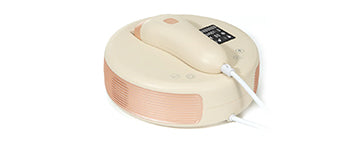Laser hair removal can leave your skin smooth, soft, and hair-free, but sometimes, it can go wrong, leaving your skin with hyperpigmentation in the form of dark spots or patches around where the treatment has been carried out.
Below, find out what hyperpigmentation is, why it happens, and if it fades. We will also provide some tips on how to avoid and treat it after laser hair removal to keep your skin as good as possible. Hyperpigmentation occurs when there is an overproduction of melanin, the substance in charge of one's skin color. These are dark spots that may vary in intensity and can take weeks to months to disappear.
Read on for causes, tips on prevention, ways to treat hyperpigmentation, and answers to commonly asked questions.
What is Hyperpigmentation?
Hyperpigmentation happens when some parts of your skin become darker than the rest.
It can be caused by things like:
- Too much sun exposure(UV rays)
- Inflammationfrom acne, eczema, or skin allergies
- Hormonal changesduring pregnancy or menopause
- Medicationslike birth control pills, antibiotics, or chemotherapy drugs
All these factors make your skin produce extra melanin—the pigment that gives skin its color—causing dark patches to appear.
Can Laser Hair Removal Really Cause Hyperpigmentation?
Yes, it can! The darker-skinned population group may especially experience hyperpigmentation as a result of laser hair removal.
That's how it happens: during the treatment, though the laser targets hair follicles, it may also destroy melanocytes, the cells responsible for melanin- the skin pigment that gives color to your skin. Those harmed cells may produce too much melanin after their harm, resulting in darkened patches on your skin.
That is why it is very important to choose a qualified professional to carry out the laser treatment of your skin. With proper equipment and settings, laser treatment can greatly reduce the possibility of hyperpigmentation.
Types of Hyperpigmentation
Sunspots
Exposure to direct sunlight for long periods makes the skin darken as it reacts to the sun. A more intense form of this is sunburn. While sunspots may fade on their own, it’s recommended to treat them with creams or medication.
Post-Inflammatory Hyperpigmentation (PIH)
After laser treatment, the skin may darken right away due to inflammation but usually fades within a few hours or days. This type of darkening means the skin cells were damaged by the laser’s heat.
Onset Hyperpigmentation
During the healing process after laser hair removal, the skin may produce extra melanin, causing dark spots to appear a few days after the treatment.
Melasma
Melasma shows up as brown patches on the face, often caused by hormonal changes during pregnancy or from using birth control.
How to Treat Hyperpigmentation From Laser Hair Removal
Hyperpigmentation due to laser hair removal can be treated by a number of methods, including topical treatments, home remedies, and professional procedures. In case home remedies do not work, going to a professional will ensure effective treatment. Here is a breakdown of the available solutions.
Topical and Professional Treatment Options
- Hydroquinone:
Available as cream or gel, it works by impeding the production of melanin, therefore preventing further skin darkening.
- Microdermabrasion:
- Uses Crystals or a diamond-tipped wand to exfoliate and remove pigmented cells, enhancing skin texture and fading dark spots.
- Laser Therapies:
- Lasers, like IPL or fractional lasers, directly target pigmented skin cells to treat hyperpigmentation, scars, and wrinkles.
Natural Remedies & Home Care
- Aloe Vera Gel:
- Soothes and nourishes the skin, improves texture, and may help lighten hyperpigmentation.
- Turmeric and Yogurt Mask:
- Reduces inflammation and brightens the skin naturally.
- Lemon Juice and Honey Mask:
- The acids in lemon juice can help lighten dark areas, while honey moisturizes.
- Vitamin E Oil:
- Supports skin healing and nourishment while helping to reduce pigmentation.
- Cucumber Slices:
- Cools and hydrates the affected area to soothe irritation.
Home Care Tips for Managing Hyperpigmentation
- Always apply sunscreen, even on cloudy days, to protect against further pigmentation.
- Use mild, gentle cleansers to wash your face twice daily.
- Look for products with antioxidants to support skin healing.
- Moisturize regularly to keep skin hydrated.
- Avoid irritants until hyperpigmentation clears.
- Use a cold compress if skin feels burned or irritated to reduce discomfort.
By following these remedies and care tips, you can effectively manage and reduce hyperpigmentation from laser hair removal. If symptoms persist, professional treatment will offer more advanced solutions.
How to Prevent Hyperpigmentation Before Laser Hair Removal
Avoid Too Much Sun Exposure
Wear sunscreen and cover the treatment area to protect it from direct sunlight when going out. Too much sun can weaken your skin and make it more prone to damage during laser treatment.
Skip Harsh Chemical Products
Avoid using self-tanners or strong skincare products before your session. These products can damage the skin at a microscopic level, making it more sensitive during laser treatment.
Be Gentle with Your Skin
Wash your skin gently on the day of treatment and avoid plucking, waxing, or using depilatory creams close to the treatment date. Let your skin stay calm and nourished to prepare for the procedure.
Check Your Skin Condition
Observe your skin for cuts, burns, and pimples. Get them treated before your session to prevent complications. On the treatment day, it's important that there are no open sores because acne or cuts can interfere with how the laser works.
Conclusion
Mild hyperpigmentation may resolve on its own and can be treated at home, while serious hyperpigmentation needs different treatments treated by a doctor. You can, however, attempt to prevent hyperpigmentation during laser hair removal with some simple tips and using proper skincare.
Choose your skin products in regard to their gentleness towards your skin type. When managing your skin feels too difficult, or when there is an issue with hyperpigmentation, then relate your problems to a dermatologist.
- To learn more about laser hair removal side effects, check out our related blogs.
- Interested in at-home laser hair removal devices? Click here to learn more.






